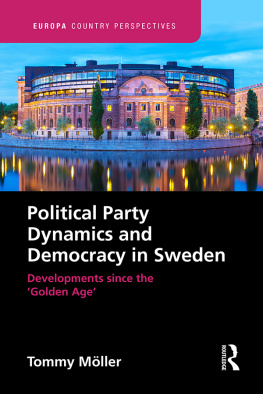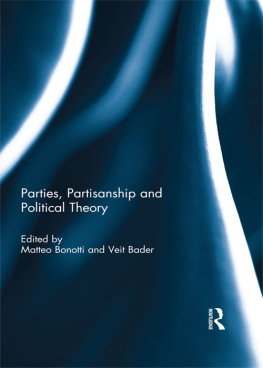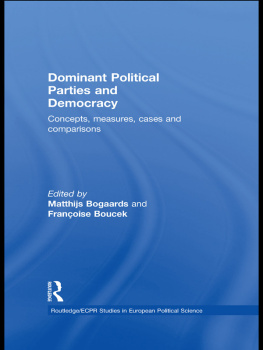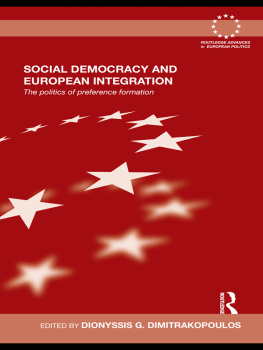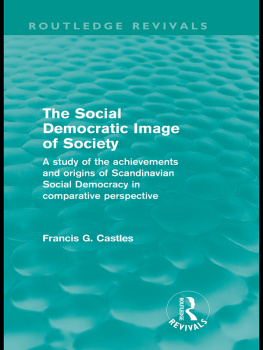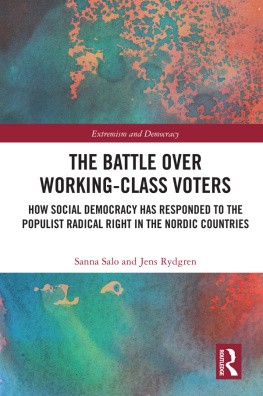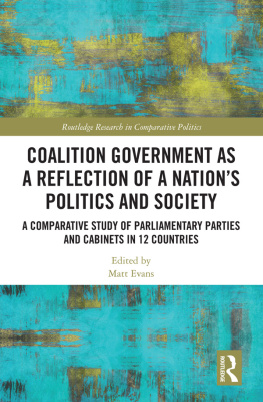Party & Society
Political Sociology series
Daniel Bland, What is Social Policy? Understanding the Welfare State
Cedric de Leon, Party & Society
Nina Eliasoph, The Politics of Volunteering
Hank Johnston, States & Social Movements
Richard Lachmann, States and Power
Sinia Maleevi, Nation-States and Nationalisms
Andrew J. Perrin, American Democracy
Copyright Cedric de Leon 2014
The right of Cedric de Leon to be identified as Author of this Work has been asserted in accordance with the UK Copyright, Designs and Patents Act 1988.
First published in 2014 by Polity Press
Polity Press
65 Bridge Street
Cambridge CB2 1UR, UK
Polity Press
350 Main Street
Malden, MA 02148, USA
All rights reserved. Except for the quotation of short passages for the purpose of criticism and review, no part of this publication may be reproduced, stored in a retrieval system, or transmitted, in any form or by any means, electronic, mechanical, photocopying, recording or otherwise, without the prior permission of the publisher.
ISBN: 978-0-7456-5984-8
A catalogue record for this book is available from the British Library.
The publisher has used its best endeavours to ensure that the URLs for external websites referred to in this book are correct and active at the time of going to press. However, the publisher has no responsibility for the websites and can make no guarantee that a site will remain live or that the content is or will remain appropriate.
Every effort has been made to trace all copyright holders, but if any have been inadvertently overlooked the publisher will be pleased to include any necessary credits in any subsequent reprint or edition.
For further information on Polity, visit our website: www.politybooks.com
For Emily, Ellis, and Attie
Contents
Introduction
The orienting objects of inquiry in contemporary political sociology are the state and civil society. The prevailing definition of the state is Max Webers notion of an actor or institution that claims the monopoly of the legitimate use of physical force within a given territory (Weber 1946: 78; emphasis in original). The state is distinguished, therefore, by its military sovereignty, although it is also widely acknowledged to be the principal steward of social services (e.g., unemployment insurance, old age pensions) and infrastructure (e.g., roads and bridges). The accepted definition of civil society is the space between the state and the market, which includes interest groups, social movements, religious organizations, and other voluntary groups (Cohen and Arato 1992; Habermas 1991). Of the latter, social movements loom largest in the political sociological imagination.
Political parties are distinct from these other entities because of their control of the system of nominations, elections, and appointments to political office (e.g., president, secretary of defense, city councilperson). They preside, in other words, over the formal institutional machinery that many of us associate with the democratic process. Further, political parties that prevail at the polls assume the reins of state power. This phenomenon of party government means that politicians direct the foreign and domestic policy of their respective communities. Accordingly, political parties have been key players in the most significant and painful social transformations of our times. The rise and fall of the Bush administration and the Blair government, for instance, are important for understanding not only American and British politics, but also the War on Terror and the recent recession, the knock-on effects of which continue to impact the lives of millions of people around the world. Parties are also implicated in the troubled advent of electoral competition in Iraq, Afghanistan, and the former Soviet bloc, as well as the rise of Islamism and socialism in the Middle East and Latin America respectively.
Despite the centrality of political parties in democratic life and their influence on current affairs, the formal parties literature is paradoxically ill-equipped to grasp the complexity and dynamism of their subject. In practice, parties stand in a fluid continuum with the state and civil society, such that it is sometimes difficult to discern where one of these three entities begins and another ends. For example, the Muslim Brotherhood, which rose to power in Egypt after the Arab Spring democratic revolution, is a political party and social movement at once that found itself exercising formal state power. Yet the scholarship on political parties tends to proceed as if little to no such fluidity exists. In voter-centered approaches, which supply the dominant theories in the field, the state is almost entirely absent, and the remaining relationship between party and society is lopsided, with voters inexplicably bearing most of the responsibility for running democratic party politics, and parties playing a passive role. Parties are implicitly defined as remote organizations that reflect the social divisions, familial loyalties, or policy preferences of a given community. Party-centered approaches, which are older and less prominent than their voter-centered counterparts, are more open to the fluidity described above. Party, state, and society interact and sometimes fuse on these accounts, but in ways not fully applicable to the contemporary political scene. Here parties are implicitly defined as organizations that are to varying degrees autonomous from their constituents and thus pursue their own motives and objectives.
Given the current state of the art, this book makes three broad contributions. First and foremost, it attempts to re-establish the place of parties alongside the two orienting objects of inquiry within political sociology. Second, it reveals the disconnect between the actual dynamism of political parties on the one hand and academic approaches to political parties on the other. Third, it suggests that sociology offers possible ways out of this impasse. While sociologists are as guilty as others for popularizing a static view of political parties, they also furnish an array of conceptual tools that are uncommon in the other disciplines of the field. Sociologists tend to be more skeptical than political scientists, economists, and psychologists, for example, of the notion that voters and politicians are rational, utility-maximizing individuals. They are more likely to suggest that meaning, culture, symbolism, history, and institutions shape the texture and outcomes of democratic party politics. There are important exceptions of course, and the ground is noticeably shifting as other social sciences go through their own cultural and historical turns, but on the whole, there is a stronger impulse in sociology to investigate the importance of such factors because of its theoretical lineage.
To arrive at such conclusions, I have had to teach myself (for the purposes of peer review) the vast literature that appears in this book. Part of my vision, therefore, is to write the reference manual I never had. It is by no means an exhaustive work, nor is it the first of its kind, but it is to my knowledge the only one that foregrounds sociologys classical and contemporary contributions to this area of inquiry. In doing so, the book aims to broaden, and thereby enrich, our sense of the scholarly terrain.



